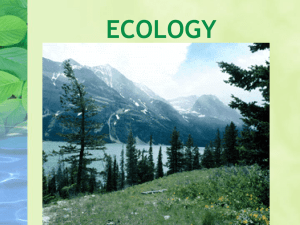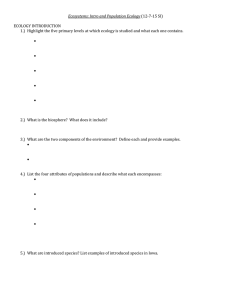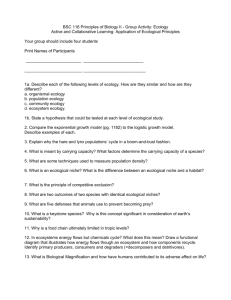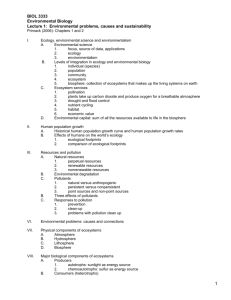Syllabus NR 5984 (3 Credits) CRN 97065 FALL SEMESTER 2006
advertisement
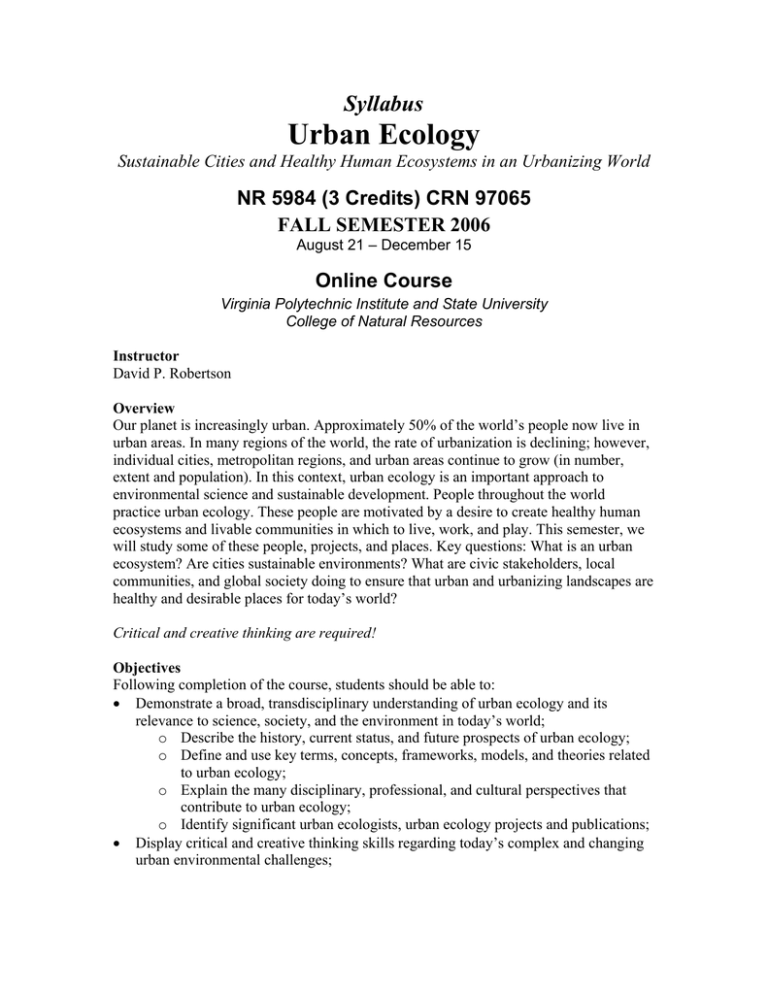
Syllabus Urban Ecology Sustainable Cities and Healthy Human Ecosystems in an Urbanizing World NR 5984 (3 Credits) CRN 97065 FALL SEMESTER 2006 August 21 – December 15 Online Course Virginia Polytechnic Institute and State University College of Natural Resources Instructor David P. Robertson Overview Our planet is increasingly urban. Approximately 50% of the world’s people now live in urban areas. In many regions of the world, the rate of urbanization is declining; however, individual cities, metropolitan regions, and urban areas continue to grow (in number, extent and population). In this context, urban ecology is an important approach to environmental science and sustainable development. People throughout the world practice urban ecology. These people are motivated by a desire to create healthy human ecosystems and livable communities in which to live, work, and play. This semester, we will study some of these people, projects, and places. Key questions: What is an urban ecosystem? Are cities sustainable environments? What are civic stakeholders, local communities, and global society doing to ensure that urban and urbanizing landscapes are healthy and desirable places for today’s world? Critical and creative thinking are required! Objectives Following completion of the course, students should be able to: x Demonstrate a broad, transdisciplinary understanding of urban ecology and its relevance to science, society, and the environment in today’s world; o Describe the history, current status, and future prospects of urban ecology; o Define and use key terms, concepts, frameworks, models, and theories related to urban ecology; o Explain the many disciplinary, professional, and cultural perspectives that contribute to urban ecology; o Identify significant urban ecologists, urban ecology projects and publications; x Display critical and creative thinking skills regarding today’s complex and changing urban environmental challenges; x o Describe and compare the environmental challenges unique to different types of urban and urbanizing areas, specific cities, and regions of the world; o Identify and explain good practices and successful examples of urban ecology; Conduct independent research and writing regarding urban ecology in action; o Collect, analyze, and interpret primary and secondary empirical data on urban ecologies; o Communicate effectively with specific audiences regarding urban ecology and related innovations in environmental governance. Methodology Methods include reading, writing, discussion, and independent research. Evaluation Class Discussion Weekly Reading Responses Final Paper 30% 40% (best 4@10% each) 30% (includes Topic Proposal) Chronology Additional Readings will be available as necessary. Week 1 – Introduction to Urban Ecology x Platt, R. H. 2004. Toward ecological cities: adapting to the 21st Century metropolis. Environment 46(5):10-27. x McGranahan, G., and D. Satterthwaite. 2002. The environmental dimensions of sustainable development for cities. Geography 87(3):213-226. x Luke, T. W. 2003. Global cities vs. “global cities:” rethinking contemporary urbanism as public ecology. Studies in Political Economy 70:11-31. x Light, A. 2003. Urban ecological citizenship. Journal of Social Philosophy 34(1):44-63. Week 2 – The Science of Urban Ecosystems: Theories and Principles of Urban Ecology x Collins, J. P., et al. 2000. A new urban ecology: modeling human communities as integral parts of ecosystems poses special problems for the development and testing of ecological theory. American Scientist 88:416-425. x Alberti, M. et al. 2003. Integrating humans into ecology: opportunites and challenges for studying urban ecosystems. BioScience 53(12):1169-1179. x Pickett, S. T. A., et al. 2001. Urban ecological systems: linking terrestrial ecological, physical, and socioeconomic components of metropolitan areas. Annual review of Ecological Systematics 32:127-157. x Redmond, C. L., et al. 2004. Integrating social science into the Long-Term Ecological Research (LTER) Network: social dimensions of ecological change and ecological dimensions of social change. Ecosystems 7:161-171. x May, R. 2004. Editorial—on the role of humanities in urban ecology: the case of St. Petersburg. Urban Ecosystems 7:7-15. Week 3 – The Management of Urban Ecosystems: Environmental Policy and Governance x x x x Lord, C. P., E. Strauss, and A. Tofler. 2003. Natural cities: urban ecology and the restoration of urban ecosystems. Virginia Environmental Law Journal 21:317385. Landy, M. 1999. Local government and environmental policy. Pages 227-260 in M. Derthick, editor. Dilemmas of Scale in America’s Federal Democracy. Cambridge University Press, Cambridge. Patterson, M. E., et al. 2003. The urbanization of wildlife management: social science, conflict, and decision making. Urban Forestry & Urban Greening 1:171183. Bengston, D. N., et al. 2004. Public policies for managing urban growth and protecting open space: policy instruments and lessons learned in the United States. Landscape and Urban Planning 69:271-286. Week 4 – Sustainable Cities: Environmental Quality, Public Health, and Human Rights x de Hollander, A., and B. Staatson. 2003. Health, environment and quality of life: an epidemiological perspective on urban development. Landscape and Urban Planning 65:53-62. x van Kamp, I., et al. 2003. Urban environmental quality and human well-being: towards a conceptual framework and demarcation of concepts; a literature study. Landscape and Urban Planning 65:5-18. x Pickett, S. T. A., et al. 2004. Resilient cities: meaning, models, and metaphor for integrating the ecological, socio-economic, and planning realms. Landscape and Urban Planning 69:369-384. x Agyeman, J., and T. Evans. 2003. Toward just sustainability in urban communities: building rights with sustainable solutions. Annals of the American Academy of Political Science and Sociology 590:35-53. Week 5 – Urban Ecology in Global Society: Postmodern and Developing Urban Regions x Satterthwaite, D. 2003. The links between poverty and the environment in urban areas of Africa, Asia, and Latin America. Annals of the American Academy of Political Science and Sociology 590:73-92. x McGranahan, G., and D. Satterthwaite. 2000. Environmental health or ecological sustainability? Reconciling the brown and green agendas in urban development. Pages 73-90 in C. Pugh, editor, Sustainable Cities in Developing Countries: Theory and Practice at the Millenium. Earthscan, London. x Marcotullio, P. J. 2003. Globalisation, urban form and environmental conditions in Asia-Pacific cities. Urban Studies 40(2):219-247.


